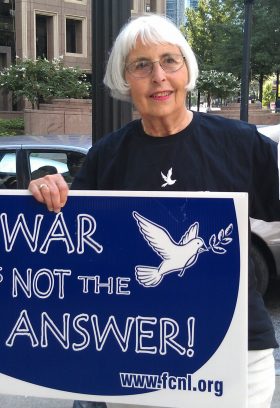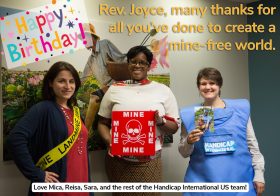From an early age, faith and family helped the Rev. Joyce Myers-Brown ’59 develop an attitude of love for every being that has guided her life.

Faith, as well as the search for peace and justice, stand as constants in the ever-changing life of the Rev. Joyce Myers-Brown ’59. As a teenager, she left the comfort of her home in Philadelphia to attend a rally featuring Martin Luther King, Jr. His speeches discussing the need to create “the beloved community” resonated with her deeply, influencing her perception of the world. His call for equality continues to fuel her desire to help those in need to this day.
From an early age, Myers-Brown’s faith and family helped her develop an attitude of love for every being. “I was raised by wonderful Christian parents and was very close to my grandfather, the Rev. Harry W. Myers, who was also my pastor,” says the ordained United Church of Christ minister. “I learned of God’s love for all people and the call to ‘life in its abundance’ for all.” After graduating high school, Myers-Brown began her search for higher education with two main criteria: she wanted a college affiliated with the United Church of Christ and she wanted to experience the South. Her search soon led her to a small school in North Carolina, relatively unknown in the North at the time—Elon College.
Like many other students, Myers-Brown’s college years helped to shape her life path. “I started out as a religion and math major. I was going to teach math in Turkey in a school related to our United Church Board for World Ministries,” she recalls. “Then, because of a variety of summer church-related service experiences, I switched to a triple major: religion, philosophy and religious education.” Though her majors changed, her path to service remained intact.
After graduating summa cum laude from Elon in 1959, Myers-Brown moved back north to attend Hartford Seminary in Connecticut. She was ordained in 1963 and shortly after was sent to serve in Angola for theological education and leadership training. Her time in the African nation, while presenting various challenges, enlightened and expanded her worldview. After more than a decade in Angola, her ability to adapt to change was tested again. “When I finally got to Angola, I expected to be there for many, many years—my whole career,” she says, “but a civil war changed that and I was evacuated in 1975.”
After her return to the United States, Myers-Brown continued to support the country she called home for 12 years, going on a yearlong media tour speaking out against the violence she saw and bringing to light the issues that colonization caused within Angola. She served as a missionary-in-residence in New York City and on staff with the Office for Church Life and Leadership before moving to Atlanta for a 10-year assignment as Southern Regional Associate with OCLL. During this time, she met the late Rev. Edward M. Brown, whom she married in 1987.

For her unwavering service to people in her community and around the word, Myers-Brown has received numerous recognitions, including the 1989 Antoinette Brown Outstanding Woman in Ministry Award, the 1998 Henry Weaver Peace Award, the 2002 Church Women United Valiant Woman Award and the 2007 CWU Human Rights Award.
Those who know Myers-Brown well can attest the world is a better place because of her. Staci Robbins stills remembers when she first met her in 2014. Robbins was teaching third grade at Montclair Elementary School, where Myers-Brown volunteers as a reading tutor. “She came twice a week to work with three students and I could see a difference in these shy readers almost immediately,” Robbins says. “The bond Reverend Joyce formed with these students and their families was incredible.” Myers-Brown continued working with students in Robbins’ class in the fourth grade; she is still in contact with them and their families. “Recently she planned a lunch for me to meet up with her and two of my former students,” Robbins says. “It is incredible to see how they have come out of their shells with her.”
Friend and fellow Prayers for Peace participant Barbara Gifford calls Myers-Brown “the backbone” of the group. “Without her, P4P would never have survived,” she says. “I am grateful for the example she is to me, and many others, of perseverance as she pursues the cause of justice. She is a faithful, praying and loving friend and I give thanks for her being in my life.”
Myers-Brown turned 80 this year, and while she cannot be as active as she once was, she plans to continue living in service to others. “I sure need to keep on keeping on because there is still so much to work for,” she says.


